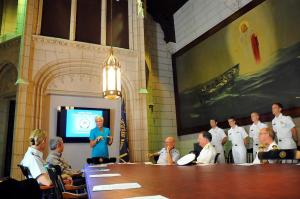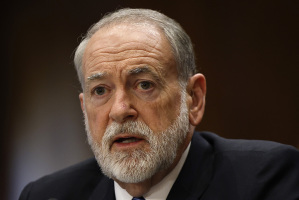Prison Reform, the Colson Way
Congress Launches Colson Task Force
No human life is irredeemable—no one is beyond the reach of God. And if anyone in recent history embodied that truth, it was Chuck Colson.

In 1969, as a young, hard-driving, fast rising political star, Chuck found himself in the oval office, accepting Richard Nixon's offer to become special counsel to the President. As Nixon's hatchet man, he helped to engineer the President's spectacular landslide reelection.
And by 1974, he was in a prison cell, his career and reputation in tatters.
But the Colson in prison was a changed man. During the darkest days of Watergate, through the witness of a friend and the writings of C. S. Lewis, Chuck Colson had given his hopes, his failures, ambitions, his sin and his life to Jesus Christ.
You probably know the rest of the story. After leaving prison, Chuck dedicated his life to bringing the Gospel of Jesus to prisoners across the country and around the world through Prison Fellowship.
And through Justice Fellowship, Colson began to tackle the numerous problems that plagued the criminal justice system—skyrocketing prison populations, overcrowding, and high recidivism rates among them.
So it is fitting that in 2014, Congress established the bipartisan Charles Colson Task Force on Federal Corrections. That our deeply divided Congress in the current political environment could agree to create and fund the Colson Task Force shows you just how important federal prison reform is in the eyes of legislators.
Task Force co-chair, former Democratic Congressman Alan Mollohan said, "I've long argued that instead of throwing good money after bad, Congress should follow the example of the states and take steps to curb federal prison population growth."
The reasons to curb federal prison population growth are many.
According to the Task Force, nearly a quarter of the Department of Justice's budget goes to federal corrections—that's seven billion dollars. And fueled by mandatory minimum sentences, the abolition of parole and reduced good time, the federal population has increased nearly eight-fold since 1980. As Federal Bureau of Prisons Director Charles Samuels told the Colson Task Force, "Crowding is a very real danger in prisons, causing frustration and anger for offenders whose access to basic necessities like toilets and showers. . . becomes very limited and who face hours of idleness resulting from a limited availability of productive work and program opportunities."
As a member of the Task Force, Prison Fellowship's Jim Liske believes the key to reforming the federal corrections system is taking a restorative approach. "At its heart," he said, "crime isn't about law-breaking; it's about violating the peace and wholeness of the entire community. Public safety may require that we lock someone up . . . but when offenders have the opportunity for redemption and restoration by making amends to their victims, changing their thinking, and earning back the public's trust, the community can find healing and move beyond the vicious cycle of crime and incarceration."
Needless to say, the Task Force has a big job ahead. But former Virginia Congressman Frank Wolf, who sponsored legislation to form the task force and to name it after Chuck, is optimistic: "By channeling Chuck's impactful work," he said, "and focusing on the differences made through Prison Fellowship and Justice Fellowship, we are bound to see positive change in our prison system."
And there is one more person I'd like for you to hear from: Colson Task Force co-Chair and former Congressman J. C. Watts. I was beyond honored to interview him on "BreakPoint This Week." Please, come to BreakPoint.org to hear his perspective on the critical need for prison reform—and his reflections on the life and legacy of Chuck Colson.





























